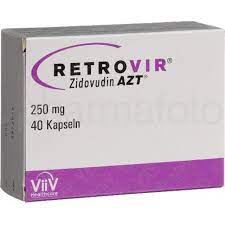Retrovir

Retrovir: Managing HIV with Zidovudine
Retrovir Overview:
Retrovir, also known as Zidovudine (AZT), is a nucleoside analog reverse transcriptase inhibitor (NRTI) used in the management of Human Immunodeficiency Virus (HIV) infection. As an antiretroviral drug, it structurally resembles thymidine but differs in composition. Its generic name is Zidovudine, and it is also referred to as Azidothymidine (AZT).
Historical Significance:
AZT was the first approved treatment for HIV, challenging the belief that HIV/AIDS inevitably led to imminent death. By breaking down into chemicals after ingestion, Retrovir inhibits HIV from infecting new cells, although it doesn’t impact already infected cells. HIV weakens the immune system by depleting T4 cells, making individuals more susceptible to illnesses and infections.
Treatment Guidelines:
The U.S. Public Health Service recommends combining Zidovudine with three of four different anti-HIV medications, often referred to as a “drug cocktail.” Initial treatment for HIV typically involves this combination.
Dosage Information:
The optimal dosage of Retrovir is yet to be precisely determined, but current recommendations range from 300 to 600 mg daily. Combivir and Trizivir are combination medications containing Retrovir along with other nucleoside analog drugs, offering ease of administration.
Combination Medications:
- Combivir: Contains 300 mg of Retrovir and 150 mg of Lamivudine (Epivir).
- Trizivir: Includes the same medications as Combivir along with 300 mg of Abacavir (Ziagen).
Administration and Forms:
Retrovir is available in capsules, tablets, and syrup, providing flexibility in administration. Consider exploring online Canadian pharmacies for accessible medication options and reliable customer service at competitive prices.
Side Effects and Considerations:
Side effects may include skin rashes, headaches, weakness, itching, nausea, nervousness, dizziness, pain in the stomach, confusion, muscle aches, loss of appetite, speech difficulties, sweating, fever, abnormal bleeding or bruising, muscle loss, sore throat, and nail color changes in African American patients. Additionally, Retrovir is employed to prevent mother-to-baby transmission of the HIV virus.
In conclusion, Retrovir has played a pivotal role in transforming HIV/AIDS treatment, and ongoing research aims to refine dosage guidelines for optimal effectiveness.



